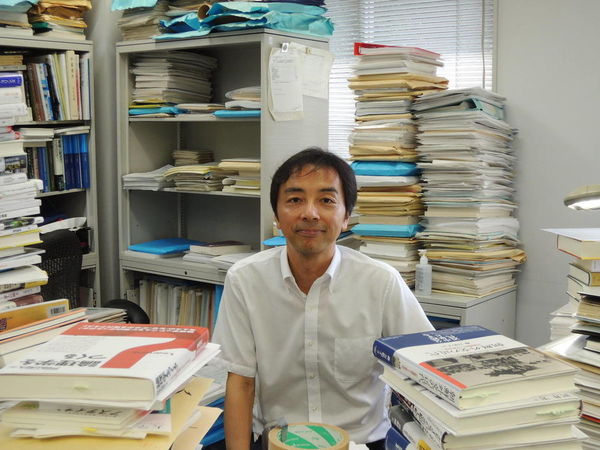One of the things Nagoya University can boast about is The University of Nagoya Press. I heard this from an acquaintance in Tokyo. The university press may be small but punches well above its weight in the quality of its output, I'm told, with a remarkably high success rate in winning academic publication awards. I have been tasked to find out what its secret is.
The book review section of the Mainichi Newspapers dated August 13 was unreserved in its praise for this university press, commending "the ambition and courage of the organization that published this book" and observing that "no other academic publishing house can match its vigor at present." The book reviewed here is Essential Scientific Writings in Renaissance Europe, an opus comprising two volumes, each around 650 pages, priced as much as 9,936 yen including tax, and with highly academic content. The reviewer explained that the reason for picking a book like this for a general-interest book review was not just because the content of the book itself merited it but also because they wanted to write about the background of its publication.
The book claims to be a "comprehensive compilation of human knowledge of the universe" and includes 30 scholarly works that are representative of the era, all translated into Japanese for the first time, which include not only scientific writings as we understand the term ― by the likes of Newton, Kepler and Boyle ― but also text covering a broad range of subjects from cooking to hot springs to alchemy. The book is academic in nature but not in the way that rejects non-academic readers. Nonetheless, with the publishing industry in a long drawn-out slump, it certainly takes courage to publish such an ambitious book.
So what is this reputable publishing house, Meidai Press?
Well, as soon as I started, I stumbled. Apparently, the University of Nagoya Press is not part of Meidai. Its English name, the University of Nagoya Press, is a misnomer; the more accurate description would be the "Universities of Nagoya" Press.
The publishing house was founded in 1982 for the purpose of publishing the research output of academics affiliated to "Nagoya University and other universities in the Chubu Region", as well as other authors' works of high academic merit which would not be profitable enough to be taken on by commercial publishers. With its vision of "contributing to the promotion of science and culture in the Chubu Region and in Japan", the Press sought the support of the wider local community. The 10-year anniversary publication of the Press recalls the early days, when academic publishing was at its rock bottom and also extremely concentrated in Tokyo, describing how older university presses watched in bated breath, wondering about the chance of its survival in Nagoya. It absolutely needed to muster the support of the local community and, according to the anniversary book, that was indeed how its success was achieved. The chairperson of the Press is the President of Meidai and the director is a Meidai professor, but the board also includes the principals of local universities as councilors.
The University of Nagoya Press is now a general incorporated foundation, with a rented office in the Meidai Information Plaza building (which was built by the Press) next to the Toyoda Auditorium on the Higashiyama Campus.
I visited Mr. Sougo Tachibana, a senior director of the Press who doubles as the chief editor. According to him, the breakdown of their authors is "one third Meidai, one third Chubu Region and one third other." Although the Press is still firmly rooted in the region, it seems the net is cast wider where needed. This approach has resulted in the publication of 30-odd books each year, totaling 883 titles as at the end of August 2017 and winning 174 awards from various organizations and academic associations. This puts its batting rate (if one ignores the fact that some books win multiple awards) at around 20% ― impressively high indeed.

Sougo Tachibana, Chief Editor
"What is the secret of your success?", I asked. Tachibana replied:
"We are often asked that, but there isn't anything special. I guess we receive many awards because our books show our authors at their best. We do not set out to win awards; we just focus on making good books. That means good topics and, importantly, good writing."......>read more on the Meidai Watch
 |
Atsuko Tsuji: Earned B.A. in Arts, College of Arts and Sciences, the University of Tokyo in 1976. Joined The Asahi Shimbun Company in 1979 as a journalist and wrote many articles in science and technology area for newspaper and magazines published by the company including editorial pieces. Knight Science Journalism Fellow at Massachusetts Institute of Technology in 1989 and Reuters Fellow at University of Oxford in 2014. Designated Professor of Nagoya University's Institute of International Education and Exchange since October 2016.
|